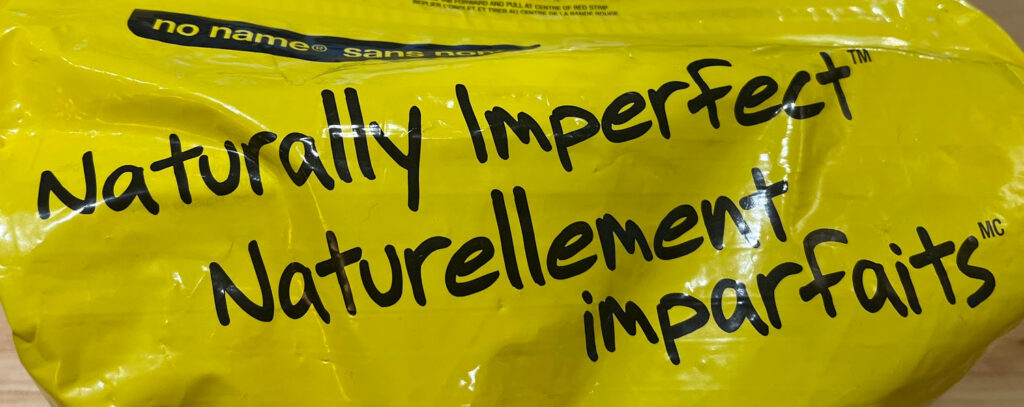
Disclaimer: This isn’t a criticism of the no name brand, Loblaws, or Superstore. It is an observation on our consumption habits.
I have to admit I watch for these Naturally Imperfect grocery items when shopping at the various stores that sell the line. They are a little less expensive and they tend to involve a little less plastic packaging. Sometimes you might even find a bag of half a dozen cucumbers that aren’t individually wrapped inside another large wrapper. Or some smokies that are a little beat up but really inexpensive and less over-packaged.
Anyone who grows their own produce will know that vegetables and fruit are not perfect. Oddly shaped carrots, zucchinis yellow on one side, curly English cucumbers, and tomatoes with splits and scars.
And so, while putting together some berries and homemade yogurt the other day, it struck me as quite ironic that the marketing wizards have come up with a way to make imperfect food a special exception.
It occurred to me that most of the food we see in the produce aisle ought to be labelled Perfectly Unnatural. Or, perhaps, Inexplicably Unblemished .
Consider that in 2014, it was estimated that Canadians waste somewhere around $31 billion worth of food and that food waste in North America and Europe is between 95 and 115kg per capita per year. That’s a horrible amount of food to waste at any time. Worse yet when people are struggling to make ends meet at the grocery store (No, Premier Stefanson, it is not about the Carbon Tax).
It might be tempting to blame this on the grocery stores. But the grocers are only responding to the reality of marketing to us folks who want good-looking produce. By expecting cosmetically perfect food, we are supporting industrial farming and perpetuating a culture of unsustainable food management. Maybe it is time for a change of perspective.
Some food loss is unavoidable for health and safety reasons”, however, the consumers’ demand for cosmetically perfect fruits and vegetables has created an unnecessary amount of waste. Farmers, distributors, and supermarkets reinforce these harmful behaviours throughout the food supply chain, in order to satisfy the demand of their customers.
UBC Insistence on Cosmetically Perfect Fruits & Vegetables
While some specialized marketers are now beginning to cater to the imperfect product market, we have a long way to go because, really, boutique “natural” produce is not the answer. We need to start being more aware of our food choices. Choosing to be okay with stuff that is a little blemished. Refusing over-packaged groceries (sometimes done strictly to protect the food from bumps and bruises so it shows better). Buying less so we waste less. Supporting local small producers. Composting what we don’t use (YES! It can be done in an apartment but we should be demanding community composting too).
When all is said and done, good food, grown with care, in good soil, and healthy conditions, provides good nutrition, great taste, and an enjoyable experience. This is perfect food.
